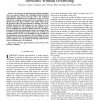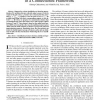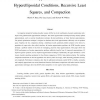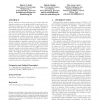116
click to vote
CDC
2010
IEEE
14 years 9 months ago
2010
IEEE
Abstract-- We consider reinforcement learning, and in particular, the Q-learning algorithm in large state and action spaces. In order to cope with the size of the spaces, a functio...
138
click to vote
CORR
2010
Springer
15 years 19 days ago
2010
Springer
We propose a new approach to value function approximation which combines linear temporal difference reinforcement learning with subspace identification. In practical applications...
102
click to vote
TNN
2008
15 years 1 months ago
2008
In this paper, an optimized approximation algorithm (OAA) is proposed to address the overfitting problem in function approximation using neural networks (NNs). The optimized approx...
136
click to vote
TNN
2008
15 years 1 months ago
2008
Abstract--Suppose for a given classification or function approximation (FA) problem data are collected using sensors. From the output of the th sensor, features are extracted, ther...
121
click to vote
TEC
2008
15 years 1 months ago
2008
An important strength of learning classifier systems (LCSs) lies in the combination of genetic optimization techniques with gradient-based approximation techniques. The chosen app...
115
click to vote
SCL
2008
15 years 2 months ago
2008
ABSTRACT: Linear function approximations based on random projections are proposed and justified for a class of fixed point and minimization problems. KEY WORDS: random projections,...
118
click to vote
CORR
2010
Springer
15 years 2 months ago
2010
Springer
In this paper, we consider the problem of planning and learning in the infinite-horizon discounted-reward Markov decision problems. We propose a novel iterative direct policysearc...
104
click to vote
GECCO
2008
Springer
15 years 3 months ago
2008
Springer
Recent advances in XCS technology have shown that selfadaptive mutation can be highly useful to speed-up the evolutionary progress in XCS. Moreover, recent publications have shown...
113
click to vote
GECCO
2008
Springer
15 years 3 months ago
2008
Springer
We propose an algorithm for function approximation that evolves a set of hierarchical piece-wise linear regressors. The algorithm, named HIRE-Lin, follows the iterative rule learn...
112
click to vote
WSC
2004
15 years 3 months ago
2004
Monte Carlo simulation techniques that use function approximations have been successfully applied to approximately price multi-dimensional American options. However, for many pric...




